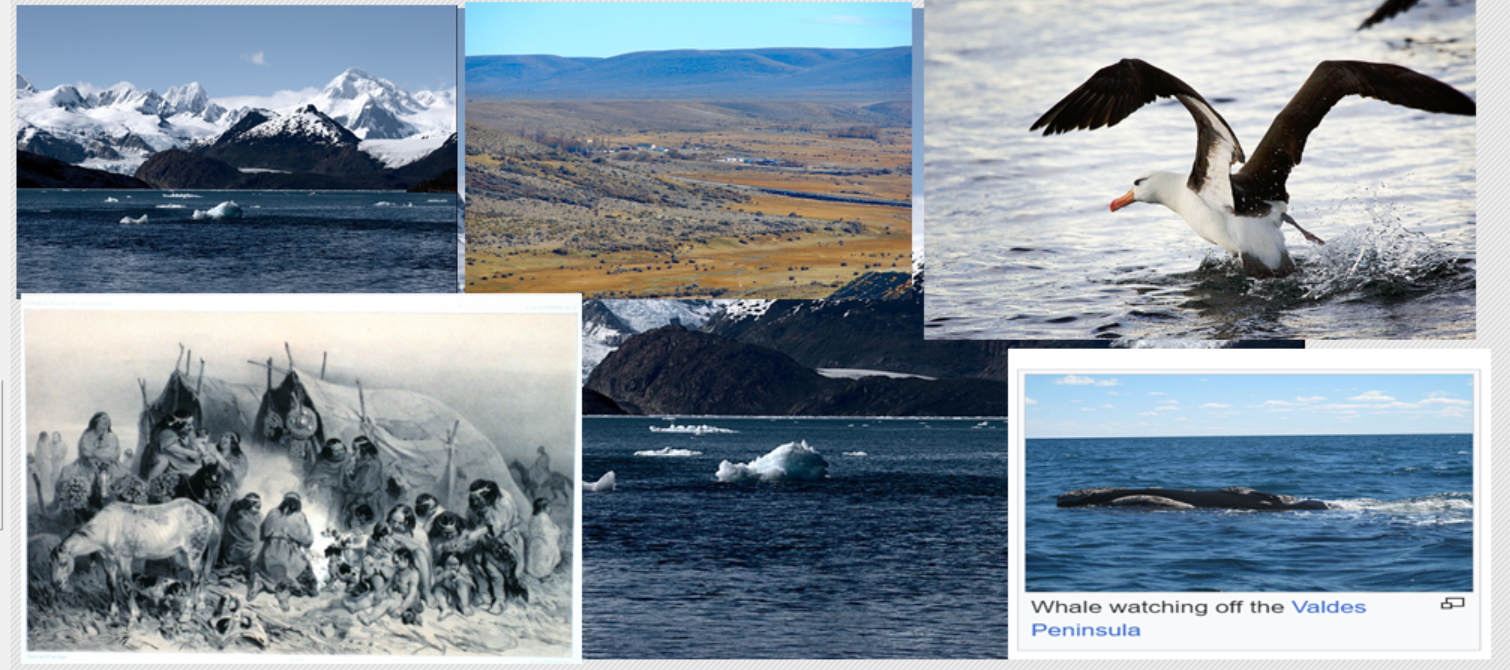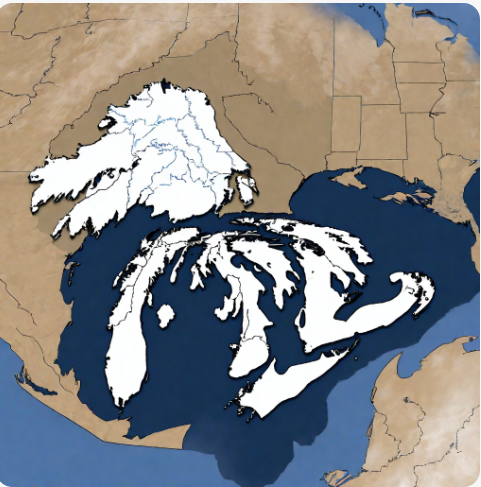Pre-Columbian Era
Indigenous Inhabitants: Patagonia was originally inhabited by several indigenous groups, including the Mapuche, Tehuelche, and Selk'nam (Ona). These groups had rich cultural traditions and adapted to the diverse and often harsh environments of the region.
Archaeological Evidence: Sites like Cueva de las Manos, with its ancient hand paintings, provide evidence of human presence dating back thousands of years.
European Exploration and Colonization
Ferdinand Magellan: The Portuguese explorer, sailing for Spain, was the first European to navigate the strait that now bears his name, the Strait of Magellan, in 1520.
Sir Francis Drake: The English privateer navigated the southern tip of South America via the Drake Passage in the late 16th century.
Early Settlements: European settlements began to establish in the 19th century, primarily driven by explorers, missionaries, and later settlers looking for new land.
Modern Era
Territorial Disputes: During the 19th and early 20th centuries, Argentina and Chile had several disputes over the boundaries of Patagonia, which were eventually resolved through treaties and arbitration.
Economic Development: The region's economy historically relied on sheep farming, but tourism, oil extraction, and natural gas production have become significant economic drivers.
Geography of Patagonia
Patagonia is renowned for its dramatic and diverse landscapes, which include:
The Andes Mountains
Western Patagonia: Characterized by the southern Andes, this area includes:
Glaciers: Such as Perito Moreno Glacier.
Lakes: Including Lake Argentino and Lake Nahuel Huapi.
Fjords and Temperate Rainforests: Found in the coastal areas of Chilean Patagonia.
Eastern Patagonia
Steppes and Deserts: The Patagonian steppe is a vast, arid plateau that stretches across much of the region. It's known for its dry, windy conditions and sparse vegetation.
Tablelands: Elevated, flat areas that are a significant feature of the Patagonian landscape.
Coastal Regions
Pacific Coast: Features dramatic fjords and is less populated due to its rugged terrain and challenging climate.
Atlantic Coast: Home to significant wildlife reserves, including Península Valdés, known for its marine life like whales, seals, and penguins.
Southern Patagonia
Tierra del Fuego: An archipelago at the southern tip of South America, divided between Argentina and Chile, known for its rugged landscapes and Ushuaia, the southernmost city in the world.
Strait of Magellan: A natural passage between the Atlantic and Pacific Oceans.
Beagle Channel: Another significant navigational route.
Drake Passage: The body of water between South America's southern tip and Antarctica, known for its rough seas.
Climate
Varied Climates: Ranges from the humid, temperate climates of the western fjords and rainforests to the arid, windy steppes of the east.
Glacial Influence: The presence of numerous glaciers influences the climate, particularly in the southern Andes.
Flora and Fauna
Unique Ecosystems: Includes diverse species such as guanacos, rheas, Andean condors, and a variety of marine life.
Protected Areas: National parks like Torres del Paine in Chile and Los Glaciares in Argentina protect vast tracts of wilderness and are popular destinations for ecotourism.
Human Geography
Population Centers: Major cities include Bariloche, Comodoro Rivadavia, and Río Gallegos in Argentina, and Punta Arenas in Chile.
Economic Activities: Sheep farming, oil and gas extraction, fishing, and increasingly, tourism, particularly ecotourism and adventure tourism.
Patagonia's history and geography combine to create a region of stunning natural beauty, rich cultural heritage, and significant economic importance. Its vast, unspoiled landscapes continue to draw adventurers, nature lovers, and those interested in its unique cultural and historical background.
Indigenous Inhabitants: Patagonia was originally inhabited by several indigenous groups, including the Mapuche, Tehuelche, and Selk'nam (Ona). These groups had rich cultural traditions and adapted to the diverse and often harsh environments of the region.
Archaeological Evidence: Sites like Cueva de las Manos, with its ancient hand paintings, provide evidence of human presence dating back thousands of years.
European Exploration and Colonization
Ferdinand Magellan: The Portuguese explorer, sailing for Spain, was the first European to navigate the strait that now bears his name, the Strait of Magellan, in 1520.
Sir Francis Drake: The English privateer navigated the southern tip of South America via the Drake Passage in the late 16th century.
Early Settlements: European settlements began to establish in the 19th century, primarily driven by explorers, missionaries, and later settlers looking for new land.
Modern Era
Territorial Disputes: During the 19th and early 20th centuries, Argentina and Chile had several disputes over the boundaries of Patagonia, which were eventually resolved through treaties and arbitration.
Economic Development: The region's economy historically relied on sheep farming, but tourism, oil extraction, and natural gas production have become significant economic drivers.
Geography of Patagonia
Patagonia is renowned for its dramatic and diverse landscapes, which include:
The Andes Mountains
Western Patagonia: Characterized by the southern Andes, this area includes:
Glaciers: Such as Perito Moreno Glacier.
Lakes: Including Lake Argentino and Lake Nahuel Huapi.
Fjords and Temperate Rainforests: Found in the coastal areas of Chilean Patagonia.
Eastern Patagonia
Steppes and Deserts: The Patagonian steppe is a vast, arid plateau that stretches across much of the region. It's known for its dry, windy conditions and sparse vegetation.
Tablelands: Elevated, flat areas that are a significant feature of the Patagonian landscape.
Coastal Regions
Pacific Coast: Features dramatic fjords and is less populated due to its rugged terrain and challenging climate.
Atlantic Coast: Home to significant wildlife reserves, including Península Valdés, known for its marine life like whales, seals, and penguins.
Southern Patagonia
Tierra del Fuego: An archipelago at the southern tip of South America, divided between Argentina and Chile, known for its rugged landscapes and Ushuaia, the southernmost city in the world.
Strait of Magellan: A natural passage between the Atlantic and Pacific Oceans.
Beagle Channel: Another significant navigational route.
Drake Passage: The body of water between South America's southern tip and Antarctica, known for its rough seas.
Climate
Varied Climates: Ranges from the humid, temperate climates of the western fjords and rainforests to the arid, windy steppes of the east.
Glacial Influence: The presence of numerous glaciers influences the climate, particularly in the southern Andes.
Flora and Fauna
Unique Ecosystems: Includes diverse species such as guanacos, rheas, Andean condors, and a variety of marine life.
Protected Areas: National parks like Torres del Paine in Chile and Los Glaciares in Argentina protect vast tracts of wilderness and are popular destinations for ecotourism.
Human Geography
Population Centers: Major cities include Bariloche, Comodoro Rivadavia, and Río Gallegos in Argentina, and Punta Arenas in Chile.
Economic Activities: Sheep farming, oil and gas extraction, fishing, and increasingly, tourism, particularly ecotourism and adventure tourism.
Patagonia's history and geography combine to create a region of stunning natural beauty, rich cultural heritage, and significant economic importance. Its vast, unspoiled landscapes continue to draw adventurers, nature lovers, and those interested in its unique cultural and historical background.
Pre-Columbian Era
Indigenous Inhabitants: Patagonia was originally inhabited by several indigenous groups, including the Mapuche, Tehuelche, and Selk'nam (Ona). These groups had rich cultural traditions and adapted to the diverse and often harsh environments of the region.
Archaeological Evidence: Sites like Cueva de las Manos, with its ancient hand paintings, provide evidence of human presence dating back thousands of years.
European Exploration and Colonization
Ferdinand Magellan: The Portuguese explorer, sailing for Spain, was the first European to navigate the strait that now bears his name, the Strait of Magellan, in 1520.
Sir Francis Drake: The English privateer navigated the southern tip of South America via the Drake Passage in the late 16th century.
Early Settlements: European settlements began to establish in the 19th century, primarily driven by explorers, missionaries, and later settlers looking for new land.
Modern Era
Territorial Disputes: During the 19th and early 20th centuries, Argentina and Chile had several disputes over the boundaries of Patagonia, which were eventually resolved through treaties and arbitration.
Economic Development: The region's economy historically relied on sheep farming, but tourism, oil extraction, and natural gas production have become significant economic drivers.
Geography of Patagonia
Patagonia is renowned for its dramatic and diverse landscapes, which include:
The Andes Mountains
Western Patagonia: Characterized by the southern Andes, this area includes:
Glaciers: Such as Perito Moreno Glacier.
Lakes: Including Lake Argentino and Lake Nahuel Huapi.
Fjords and Temperate Rainforests: Found in the coastal areas of Chilean Patagonia.
Eastern Patagonia
Steppes and Deserts: The Patagonian steppe is a vast, arid plateau that stretches across much of the region. It's known for its dry, windy conditions and sparse vegetation.
Tablelands: Elevated, flat areas that are a significant feature of the Patagonian landscape.
Coastal Regions
Pacific Coast: Features dramatic fjords and is less populated due to its rugged terrain and challenging climate.
Atlantic Coast: Home to significant wildlife reserves, including Península Valdés, known for its marine life like whales, seals, and penguins.
Southern Patagonia
Tierra del Fuego: An archipelago at the southern tip of South America, divided between Argentina and Chile, known for its rugged landscapes and Ushuaia, the southernmost city in the world.
Strait of Magellan: A natural passage between the Atlantic and Pacific Oceans.
Beagle Channel: Another significant navigational route.
Drake Passage: The body of water between South America's southern tip and Antarctica, known for its rough seas.
Climate
Varied Climates: Ranges from the humid, temperate climates of the western fjords and rainforests to the arid, windy steppes of the east.
Glacial Influence: The presence of numerous glaciers influences the climate, particularly in the southern Andes.
Flora and Fauna
Unique Ecosystems: Includes diverse species such as guanacos, rheas, Andean condors, and a variety of marine life.
Protected Areas: National parks like Torres del Paine in Chile and Los Glaciares in Argentina protect vast tracts of wilderness and are popular destinations for ecotourism.
Human Geography
Population Centers: Major cities include Bariloche, Comodoro Rivadavia, and Río Gallegos in Argentina, and Punta Arenas in Chile.
Economic Activities: Sheep farming, oil and gas extraction, fishing, and increasingly, tourism, particularly ecotourism and adventure tourism.
Patagonia's history and geography combine to create a region of stunning natural beauty, rich cultural heritage, and significant economic importance. Its vast, unspoiled landscapes continue to draw adventurers, nature lovers, and those interested in its unique cultural and historical background.
0 Comentários
0 Compartilhamentos
353 Visualizações







